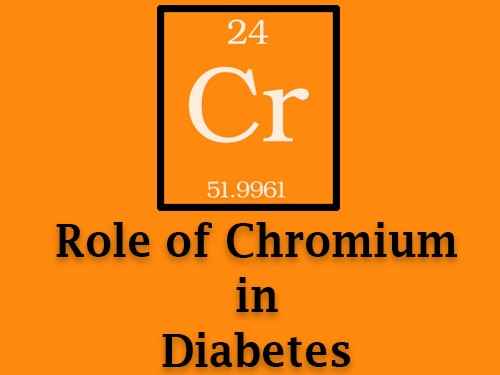While chrome may be great for your car’s bumper, it is not good for your general health. To be clear, chrome metal is formed by electroplating a very thin layer of the mineral chromium onto metal or plastic.
It seems that chromium is required for insulin to function at its best. Low chromium levels have been linked to an increased risk of high blood sugar and diabetes, as well as an increased risk of heart disease, high triglyceride levels, and high cholesterol.
Many people have low amounts of this vital mineral, especially the elderly, physically active persons, pregnant women, and those who eat a lot of sugar and sugar-filled foods.
Chromium: Fundamentals
In the body, chromium (Cr) is mostly found in its trivalent state, or Cr3+. It is believed that Cr3+ functions as a cofactor for the protein chromodulin. Chromodulin is thought to increase insulin’s signaling activity following its binding to bodily cells. The elevated insulin signaling activity would cause cells to absorb glucose more readily, lowering the blood’s sugar content.
While there are many “unknowns” in the field of chromium, it is thought that men over the age of 14 receive about 35 mcg of the mineral daily (Adequate Intake), while women over the age of 14 receive about 24 mcg.
It is unknown if low chromium levels during pregnancy are linked to gestational diabetes, however higher levels of chromium are required during pregnancy (29 mcg/day) and lactation (44 mcg/day). Children need smaller doses depending on their age, whereas adults over 50 need roughly 30 mcg each day. Chromium also exists in the hexavalent state, or Cr6+. This particular type of chromium is harmful and has a history of cancer.
Diabetes and Chromium
Though the results of most research on the subject have not been totally conclusive, adding chromium to the diet does not appear to have a substantial effect on blood sugar levels in those who are not diabetics
In the most recent strong evidence, taking 250mcg daily significantly reduced blood sugar levels but had no effect on A1c, according to a meta-analysis of seven randomized, placebo-controlled trials (RPCTs, the current gold standard type of study).
The administration of 200-1000 mcg/day of chromium was not shown to be beneficial in lowering blood sugar levels or the A1c % in another meta-analysis encompassing nine RPCTs.2.
A1c percentages and blood glucose levels were discovered to be lowered by chromium picolinate, a specific type of chromium, when combined with biotin, a B-vitamin. Additionally, some research suggests that chromium supplementation during pregnancy may aid with blood sugar regulation.
Overall, the studies show that appropriate levels of chromium are crucial but do not present particularly compelling evidence for specific chromium supplementation. There is insufficient proof to suggest that chromium can enhance insulin sensitivity in people who are at risk of developing diabetes.
The majority of multivitamin and mineral supplements contain chromium. Broccoli, green beans, grape juice, whole grain products, chicken, lean beef, and orange juice are additional foods high in chromium.
Currently, the most sensible course of action appears to be obtaining chromium from the kinds of meals that are often advised for diabetes as well as a daily multivitamin/multimineral supplement until further and larger studies are finished.
Consider including B-complex vitamins if you choose to take chromium supplements separately. One of the most compelling studies suggested that B-complex vitamins, including biotin, may work to enhance the effects of chromium.
Safety-Related Questions
For at least a few months, chromium picolinate at 1000 mcg/day appears to be safe. If you do decide to take supplements, it is recommended that you stay with chromium picolinate and make sure the supplement you buy has undergone independent laboratory testing. This is crucial since there is a chance that the supplement may include hexavalent chromium, which is a known carcinogen.
This kind of contamination can be detected by independent lab testing, however testing is optional. Generally speaking, only purchase supplements from businesses that have conducted product testing. Rarely, there have been severe side effects, including as liver and renal damage. For the best guidance on dose, consult your pharmacist and doctor.
DiabetesCouncils Article | Reviewed by Dr. Sergii Vasyliuk MD on June 02, 2020


Be the first to comment on "Is Chromium Beneficial for Diabetes?"